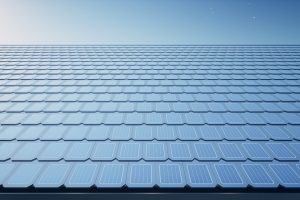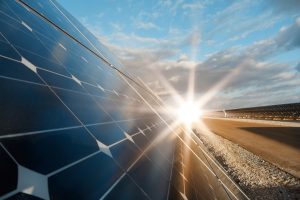
The rise of solar roofing reflects a significant shift towards renewable energy solutions. Homeowners increasingly recognize the value of integrating solar technology into their roofs, driven by the need for sustainable living and energy savings.
Economic pressure has intensified the focus on energy savings. Rising utility costs compel many to consider alternatives like solar roofing.
Below, we’ll explore the benefits and emerging trends in solar roofing. Key topics include:
- Cost savings and financial incentives
- Increased home value through solar installations
- Environmental impacts and sustainability contributions
Understanding Solar Roofing
Solar roofing refers to roofing systems that integrate solar technology, primarily through photovoltaic panels or solar shingles. These components work together to harness solar energy and convert it into usable electricity for your home.
Key Components
- Photovoltaic Cells: These cells are the heart of solar panels, converting sunlight directly into electricity through the photovoltaic effect. When sunlight strikes the cells, it causes electrons to flow, generating an electric current.
- Solar Shingles: An innovative alternative to traditional panels, solar shingles resemble regular roofing materials. They serve dual purposes—protecting your roof while generating electricity.
Types of Solar Roofing Systems
- Traditional Solar Panels: Mounted on top of existing roofs, they offer flexibility in installation and can be added to most structures.
- Solar Shingles: Integrated seamlessly into the roof design, these provide aesthetic appeal along with energy generation.
- Thin-Film Solar Cells: Lightweight and flexible, they can be applied on various surfaces but generally have a lower efficiency compared to traditional panels.
Understanding these components helps homeowners make informed decisions about their energy needs and the best options for integrating solar technology into their roofing systems.
The Economic Benefits of Solar Roofing
The economic advantages of solar roofing extend beyond initial installation costs. Homeowners can experience significant cost savings from using solar panels over time.
1. Long-term electricity bill reduction
By generating your own electricity, you can drastically lower or even eliminate monthly utility bills. This translates to substantial savings over the lifespan of the solar system.
2. Upfront costs vs. potential savings
While the initial investment for solar roofing may seem high, various tax incentives and rebates can help offset these expenses. Federal tax credits, state programs, and local incentives significantly reduce the overall financial burden, making solar a more accessible option.
To assess the cost-effectiveness of solar roofing, consider using these calculation methods:
- Payback period: Calculate how long it takes for savings on electricity bills to equal the upfront costs.
- Return on investment (ROI): Determine how much you save relative to your investment over time.
- Levelized cost of energy (LCOE): Evaluate the average lifetime cost per unit of energy produced by your solar system.
Understanding these metrics allows homeowners to make informed decisions about transitioning to solar energy and maximizing their long-term financial benefits.
Increased Home Value with Solar Roofing
Solar roofing significantly impacts property values, making homes with these installations more attractive to potential buyers. Key statistics highlight this trend:
- Increased Home Value: Homes equipped with solar panels can see an increase in value by approximately 17% compared to those without.
- Faster Sales: Properties featuring solar installations tend to sell 20% faster than traditional homes, reflecting buyers’ preferences for energy-efficient solutions.
The appeal of lower utility costs and environmentally friendly features drives this demand. Buyers are willing to pay a premium for homes that promise long-term savings and sustainability. With the ongoing rise in energy prices, the financial benefits of solar roofing become even more compelling.
Investing in solar not only enhances your home’s marketability but also positions it favorably in a competitive real estate landscape. Embracing solar roofing aligns with the broader movement toward energy savings, contributing to a sustainable future.
Tax Incentives and Government Support for Solar Installation
Homeowners considering solar roofing can take advantage of various tax incentives that significantly reduce installation costs. Key programs include:
- Federal Tax Credit: A substantial incentive allowing you to deduct a portion of your solar system’s installation costs from your federal taxes. This credit typically covers 26% of expenses in 2023, providing immediate savings.
- State Rebates: Many states offer additional rebates or incentives, which can vary widely based on location. These programs often aim to encourage renewable energy adoption and may drastically reduce upfront costs.
- Local Incentives: Some municipalities provide unique incentives, such as property tax exemptions for solar installations or performance-based incentives that pay you for the energy produced.
Understanding these financial opportunities helps you make an informed decision regarding solar roofing. Engaging with a knowledgeable installer can clarify which incentives apply to your specific situation, ensuring you maximize your savings potential.
Environmental Impact and Sustainability Benefits of Solar Roofing
Switching to solar roofing is a significant step towards reducing carbon emissions and dependence on fossil fuels. By using sunlight as an energy source, you can lower the need for electricity produced by conventional methods, which typically involve burning coal or natural gas. This transition results in a smaller carbon footprint, making your home part of the solution to combat climate change.
Key benefits include:
- Carbon Footprint Reduction: Solar roofing can offset around 100 tons of CO2 over its lifetime, substantially lowering greenhouse gas emissions.
- Promotion of Renewable Energy: Your adoption of solar roofing supports the growth of renewable energy, encouraging others to consider sustainable options.
- Sustainable Living Practices: Solar power integrates seamlessly with energy-efficient appliances and smart home systems, creating an eco-friendly environment.
Solar roofing not only helps in fighting climate change but also promotes a culture of sustainability. As more homeowners embrace these technologies, the collective impact on energy consumption patterns becomes more significant, resulting in greater environmental advantages. With each installation, you play a role in creating a cleaner and greener future.
Achieving Energy Independence with Solar Power Systems (Including Backup Power Solutions)
Solar roofing is essential for homeowners looking to achieve energy independence by generating their own electricity. This transition not only reduces reliance on traditional energy sources but also gives individuals greater control over their energy usage. Here are the key benefits:
1. Personal Electricity Generation
Solar panels work by converting sunlight into electricity, which means homeowners can rely less on grid power. Depending on the size of the solar system and local sunlight conditions, it’s possible for homeowners to produce nearly all of their energy needs.
2. Backup Power Systems
With the integration of battery storage solutions like the Tesla Powerwall, there are significant advantages during power outages or emergencies. These systems store excess energy generated on sunny days so that it can be used when solar production is low or during blackouts.
The benefits of adopting solar roofing and backup systems include:
- Resilience: Increased stability during severe weather events or unpredictable outages.
- Cost Savings: Reduced electricity bills along with the ability to use stored energy when grid prices are high.
- Sustainability: Continued operation using renewable resources contributes to a greener future.
Maintenance Considerations for Solar Roofing Systems
Solar roofing systems are designed to be low maintenance compared to traditional roofs. Key considerations include:
- Routine Cleaning: Keeping your solar panels clean enhances their efficiency. Dust, debris, and bird droppings can accumulate, reducing sunlight exposure.
- Inspections: Regular checks are essential to identify potential issues early. Inspecting connections, wiring, and the integrity of the panels ensures optimal performance.
- No Moving Parts: Unlike traditional roofing systems that may require frequent repairs or replacements due to wear and tear, solar panels have no moving parts, resulting in less overall maintenance.
- Longevity: Most solar roofing products come with warranties ranging from 20 to 25 years, reflecting their durability and low maintenance requirements.
Occasional cleaning and inspections are crucial for maintaining efficiency and extending the lifespan of your solar roofing system. Prioritizing these tasks ensures you reap the full benefits of your investment.
Durability, Longevity, and Aesthetic Options in Modern Solar Roofing Products
The durability of solar panels is a critical factor for homeowners considering this sustainable energy solution. Modern solar panels are designed to withstand harsh weather conditions, including high winds, hail, and heavy snow. Many manufacturers offer warranties up to 25 years, ensuring that these systems maintain their efficiency and functionality over time.
Key aspects to consider:
- Lifespan: Most solar panels have a lifespan of 25 years or more, with many maintaining at least 80% of their original efficiency after two decades.
- Weather Resistance: Panels undergo rigorous testing to ensure they can endure extreme temperatures, moisture, and UV exposure without significant degradation.
Aesthetic considerations also play a vital role in the adoption of solar roofing. The aesthetics of solar panels have evolved significantly. Homeowners now have access to various designs that enhance curb appeal while providing functionality. Options include:
- Solar Shingles: Designed to look like traditional roofing materials while generating electricity.
- Integrated Systems: Seamless integration with different architectural styles, minimizing the visual impact on your home’s overall design.
This blend of durability and innovative aesthetics allows homeowners to embrace renewable energy without compromising on style. Whether you seek sleek designs or classic looks, modern solar roofing products cater to diverse preferences while contributing positively to the environment.
Embracing the Benefits and Future Potential of Solar Roofing Systems for a Sustainable Energy Future
The transition to solar roofing represents a significant step towards sustainable solutions and energy efficiency. By adopting solar roofing systems, you contribute to:
- Environmental Sustainability: Reduce your carbon footprint while promoting renewable energy.
- Cost Savings: Experience long-term reductions in electricity bills, enhancing financial wellness.
- Increased Home Value: Boost property worth through eco-friendly features that attract buyers.
Acting now enables you to be part of the solution for a cleaner, greener future. Explore how solar roofing can transform your home and lifestyle.
Frequently Asked Questions About Solar Roofing
What is solar roofing and how does it work?
Solar roofing refers to roofing systems that incorporate photovoltaic cells or solar shingles to convert sunlight into electricity. These systems capture solar energy and transform it into usable power for homes, reducing reliance on traditional energy sources.
What are the economic benefits of installing solar roofing?
Installing solar roofing can lead to significant cost savings over time through reduced electricity bills. While there may be upfront costs, homeowners can benefit from tax incentives and rebates that lower overall expenses, making solar a cost-effective long-term investment.
How does solar roofing affect home property values?
Solar roofing can increase a home’s value, with studies showing that properties equipped with solar installations sell faster and at higher prices compared to those without. This makes solar roofing not only an energy-efficient choice but also a smart real estate investment.
Are there tax incentives available for installing solar roofing?
Yes, there are various federal and state tax incentives available for homeowners considering solar roofing. These programs can significantly reduce installation costs through credits and rebates, making solar energy more accessible.
What is the environmental impact of using solar roofing?
Transitioning to solar roofing helps reduce carbon emissions and dependence on fossil fuels, contributing to a cleaner environment. By promoting renewable energy adoption, solar roofing plays a crucial role in sustainable living practices.
What maintenance is required for solar roofing systems?
Solar roofing systems generally require low maintenance compared to traditional roofs. Routine cleaning and occasional inspections are important to ensure optimal performance, but overall upkeep is minimal.
from: https://mydividedsky.com/the-rise-and-benefits-of-solar-roofing-join-in-on-the-energy-savings/


No comments:
Post a Comment